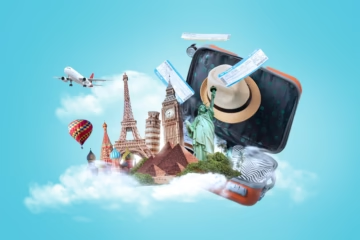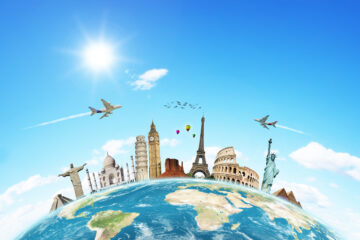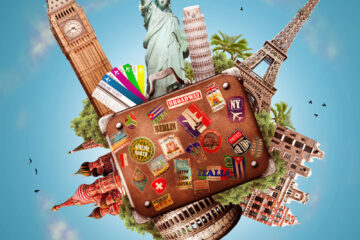Solo travel is an increasingly popular way to explore new places, experience different cultures, and find personal growth. Whether you’re traveling for adventure, self-reflection, or simply to escape the daily grind, going solo can be a liberating and rewarding experience. But, like any form of travel, it comes with its own set of risks and considerations.
So, the question remains: Is solo travel safe? The answer depends on several factors, but with the right preparation and a cautious approach, solo travel can be very safe and enjoyable. Here’s everything you need to know about staying safe while traveling alone.
Factors That Affect the Safety of Solo Travel:
- Destination: The safety of solo travel largely depends on where you’re going. Some destinations are known for being extremely safe for solo travelers, while others may have higher risks due to political instability, crime rates, or natural hazards. Researching the destination is key to understanding the local safety situation.
- Safe Destinations for Solo Travelers:
Countries like Japan, New Zealand, Iceland, Canada, and the Scandinavian countries (Sweden, Norway, Finland, Denmark) consistently rank among the safest places for solo travel. These destinations have low crime rates, good infrastructure, and excellent healthcare systems. - Destinations with Caution:
Some places might be more challenging or risky for solo travelers, especially in areas with political unrest, high crime rates, or limited infrastructure. Always check travel advisories from your government (like the U.S. Department of State or the UK Foreign Office) before planning your trip.
- Safe Destinations for Solo Travelers:
- Personal Safety Measures: Your personal safety is largely in your hands. Being mindful of your surroundings, trusting your instincts, and being prepared can reduce your risk of encountering problems. Solo travel requires a level of self-awareness, but it doesn’t mean you have to live in fear.
- Trust Your Instincts:
If something feels off or unsafe, trust your gut and remove yourself from the situation. Avoid areas that feel uncomfortable or overly isolated, especially after dark. - Stay Connected:
Regularly check in with friends or family back home. Share your itinerary, accommodation details, and any important contact information. Use location-sharing apps like Google Maps or WhatsApp to keep loved ones updated on your whereabouts. - Keep Valuables Secure:
Keep your valuables, such as your passport, money, and electronics, in a safe place. Consider using a money belt or neck pouch, especially when you’re in crowded places or unfamiliar areas. Use lockers at hostels or hotels to store valuable items when you’re out exploring.
- Trust Your Instincts:
- Accommodation Choices: Where you stay can impact your overall safety. Opting for reputable accommodations with good reviews can make a big difference. Solo travelers should prioritize safety when choosing where to stay.
- Book Accommodations in Safe Areas:
Research neighborhoods before booking your accommodation. Choose well-lit, populated areas that are easily accessible. Avoid staying in isolated areas or places with a history of crime. - Hostels or Hotels with Good Reputation:
Hostels are often a great option for solo travelers, as they foster a sense of community and offer a chance to meet fellow travelers. However, always check reviews on trusted sites like TripAdvisor, Booking.com, or Hostelworld to ensure the place is safe and has positive feedback from previous solo guests.
- Book Accommodations in Safe Areas:
- Health and Medical Considerations: Traveling solo means you are solely responsible for your health and wellbeing. It’s important to be prepared for medical emergencies and understand the healthcare options available in your destination.
- Travel Insurance:
Always purchase comprehensive travel insurance that covers both health emergencies and trip cancellations. It’s especially important to have coverage for medical care, evacuation, and lost or stolen belongings. - Carry a First Aid Kit:
Bring a small first aid kit with essentials like pain relievers, band-aids, antiseptics, any prescribed medications, and hand sanitizers. Having basic medical supplies on hand can help you handle minor issues without relying on external help. - Know Emergency Numbers:
Research emergency contacts like local police, ambulance, or consulate numbers before you travel. Make sure you’re familiar with the emergency procedures in the area.
- Travel Insurance:
- Safety During Activities: Whether you’re hiking, exploring a new city, or taking part in adrenaline-pumping activities, it’s important to follow safety guidelines. Avoid risky behaviors and know your limits.
- Research Local Activities:
If you’re planning to engage in adventurous activities like hiking, water sports, or diving, make sure to book with reputable companies that follow safety protocols. Always wear appropriate gear and never take unnecessary risks. - Stay Sober and Alert:
While it’s fun to experience the nightlife of a new city, being overly intoxicated can leave you vulnerable. Always stay aware of your surroundings and never leave your drink unattended in bars or clubs.
- Research Local Activities:
- Cultural Awareness: Understanding the local culture and customs is an essential part of staying safe. Knowing local norms helps you avoid drawing unnecessary attention to yourself and reduces the risk of inadvertently offending people.
- Learn Basic Phrases:
If you’re traveling to a non-English-speaking country, learning a few key phrases in the local language can be helpful. Even if you’re not fluent, locals appreciate when you make an effort to communicate. - Respect Local Customs:
Familiarize yourself with local customs and dress codes, especially in more conservative regions. In many places, modest clothing is expected, and certain behaviors may be viewed as disrespectful or inappropriate.
- Learn Basic Phrases:
- Meet New People, But Stay Cautious: One of the benefits of solo travel is the chance to meet new people from all over the world. However, it’s important to be cautious and protect your personal boundaries. Many solo travelers meet fellow travelers in hostels, cafes, and tours, but always prioritize your safety in any new social situation.
- Stay in Public Spaces:
If you meet someone new, stick to public spaces for socializing. Avoid going to private places, like someone else’s home, until you’re comfortable and trust the person fully. - Be Wary of Overly Friendly Strangers:
While most people you meet will be kind and friendly, always be cautious of overly friendly strangers who may have ulterior motives.
- Stay in Public Spaces:
Is Solo Travel Worth It?
Yes, solo travel is incredibly rewarding and can be a transformative experience. Traveling on your own can help you gain confidence, become more independent, and connect deeply with the places you visit. You’ll have the freedom to do exactly what you want without having to accommodate someone else’s preferences.
That said, just like any type of travel, it requires preparation and awareness. By taking the necessary precautions, doing your research, and staying alert, solo travel can be just as safe (if not safer) as traveling with a group. In fact, many solo travelers find it easier to connect with locals and other travelers, and they have the flexibility to tailor their trip to their own interests and needs.
Conclusion:
Solo travel is safe, but it requires a little more planning, awareness, and caution than traveling with a group. By choosing a safe destination, being vigilant about your surroundings, staying connected with loved ones, and following some basic safety practices, you can have an amazing and memorable solo travel experience. So go ahead, pack your bags, and enjoy the adventure of a lifetime!



0 Comments